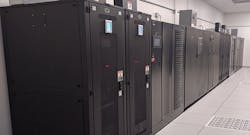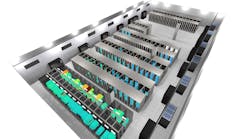Data center vendor Vertiv is expanding its line of UPS systems that can use lithium-ion batteries rather than traditional lead-acid batteries, offering more options for data center operators interested in new options for their power infrastructure.
Lithium-ion batteries are commonplace in devices like smartphones and laptop computers. But they’ve thus far been used only sparsely in the data center, where banks of lead-acid batteries have been the standard choice for providing backup power during utility outages.
Vertiv, previously known as Emerson Network Power, is one of the world’s largest vendors of power and cooling products for the data center sector. It is among the companies making the case for lithium-ion batteries as a better option than VRLA (valve-regulated lead acid) batteries. In 2016 Data Center Frontier profiled Vertiv’s first installation of a lithium-ion UPS in a data center, in this case Forsythe Data Centers facility in suburban Chicago. That site used lithium-ion battery cabinets supporting Liebert NX UPS 300kVA systems.
Advocates of lithium-ion batteries cite multiple advantages over lead-acid batteries, including a longer lifetime, reduced weight and footprint, and less rigid cooling requirements. The primary resistance point is cost: lithium-ion systems are currently 2 to 3 times the cost of a valve-regulated lead-acid (VRLA) system at the same power level and runtime.
The Liebert EXM 480V is the latest UPS system from Vertiv to be tested and qualified for lithium-ion batteries, offering a larger capacity. The lithium-ion batteries and battery cabinets are UL listed for use in data center environments.
“It is critical that we provide choices to fit the potential environment and architecture,” said Kyle Keeper, vice president, AC power product management, for Vertiv in the Americas. “Adding lithium-ion capabilities to the Liebert EXM UPS system is an important new option for our customers seeking core to edge solutions.”
More Alternatives to Lead-Acid
At present, the primary alternative to lead-acid batteries has been UPS systems using a flywheel, a spinning cylinder which generates power from kinetic energy, and continues to spin when grid power is interrupted. Although a flywheel offers a shorter ride-through time (about 20 seconds), it eliminates the need for batteries. Yahoo, Verizon/Terremark and Oracle all use flywheel UPS systems, but some data center managers remain wary of their shorter run time than battery-based UPS systems.
Lithium-ion UPS systems could provide another option. There are several other potential advantages. Lithium-ion batteries are less sensitive to temperature fluctuations and can accept changes in temperature. This allows customers to reduce their cooling capacity, as well as the size of the room that houses the UPS. It also offers additional design options, including in-row UPS deployments. One company already using this approach is Microsoft, which has adopted a distributed UPS instead of centralized battery cabinets, and uses lithium-ion battery cells on board each server






